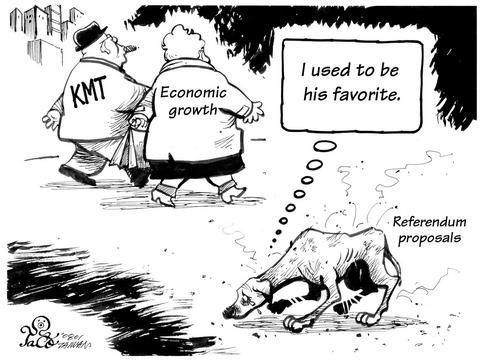
Referendums are key to democracy
By Chen Lung-chu 陳隆志
Monday, Jan 07, 2008, Page 8
There are three major political events this year: the presidential and
legislative elections, and the referendums. They are crucial to the continuance
and deepening of Taiwan's democratic system, and will significantly affect the
nation's future. Also, they are opportunities to rid ourselves of power
struggles among political parties and resolve legislative conflicts.
Among these events, the four referendums have received much public attention.
The Chinese Nationalist Party's (KMT) recent decision to call on the public to
boycott the referendums is likely to remain a point of focus during the
legislative election battle, and perhaps even the presidential campaign.
If the KMT's decision was prompted solely by fear that the Democratic
Progressive Party's referendum on recovering the KMT's stolen assets would pass,
then the KMT deserves the harshest criticism. Such behavior is reprehensible.
Referendums are a sign of a mature democracy. In the elections, we need to
support not only good candidates but also the referendums, so as to ensure
democratic development.
Chen Lung-chu is the chairman of the
Taiwan New Century Foundation.
Transitional justice is not just electioneering
By Chen Yi-shen 陳儀深
Monday, Jan 07, 2008, Page 8
The Chinese-language China Times has mobilized a group of academics to condemn
the renaming of the erstwhile Chiang Kai-shek Memorial Hall, calling it
political revenge that will lead to more conflict, instead of promoting
transitional justice. They even say that President Chen Shui-bian (陳水扁) is
attacking Chiang Kai-shek (蔣介石) so as to attract votes for his party.
One of the academics, a National Chengchi University professor, claimed that
Chen is harping on about the Chinese Nationalist Party's (KMT) stolen assets to
divert attention away from his corruption case. The professor suggests that the
Democratic Progressive Party (DPP) should establish a commission to unearth the
truth behind incidents that occurred during the martial law period.
These academics have distorted the DPP's pursuit of transitional justice, saying
it is only an election trick and a smokescreen for Chen's personal political
crisis.
But this is not true. Based on investigations conducted by the Cabinet's
Research, Development and Evaluation Commission in conjunction with experts on
Taiwanese history, the National Archives Administration held an exhibition on
documents related to the 228 Incident in March 2001. In the same year, the
Compensation Foundation for Improper Verdicts published a book on the legal and
historical aspects of political incidents during the martial-law era.
Subsequently, in June 2003, the 228 Memorial Foundation held a seminar to
discuss recently discovered historical materials related to the 228 Incident.
This led to the release of the Report on the Responsibility for the 228 Incident
in February 2006, which found that Chiang was primarily responsible for the
incident. This should be the most significant reference in the handling of the
memorial hall.
Moreover, the Council for Cultural Affairs has operated the Green Island Human
Rights Memorial Park for several years, and the military turned a former
detention center in Taipei City into Jingmei Human Rights Park last month. Those
who are concerned with the issue can criticize the government for its slow and
inadequate efforts, but they should not discredit such efforts unless they do
not support transitional justice.
I have been among those who criticized the government for doing too little, too
slowly. However, having participated in the process and observed it closely, it
has become impossible for me to criticize the government. Since the transfer of
power in 2000 entailed only the replacement of high-ranking officials, the
bureaucratic system still runs according to the old methods.
What is worse, the special legislation necessary for the investigation of truth
and responsibility has been boycotted since the 1990s by the pan-blue camp,
which enjoys a majority in the legislature.
Admittedly, the transformation of Chiang Kai-shek Memorial Hall into National
Taiwan Democracy Memorial Hall was somewhat flawed. Still, we should accept this
in light of the political environment. It is notable that even Chiang's great
grandson, Demos Chiang (蔣友柏), supported the name change, arguing that it was
wrong to set up statues of his great grandfather. Demos Chiang has also said
that the pan-blue camp has employed slogans such as "anti-Chiang" and "de-sinicization"
for political gain. His comments make a lot more sense than those of the China
Times academics.
Chen Yi-shen is an associate research
fellow at the Institute of Modern History at Academia Sinica.